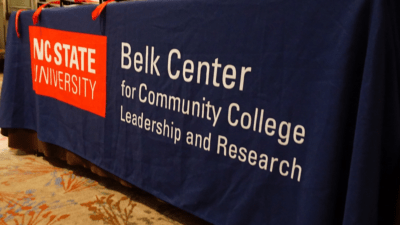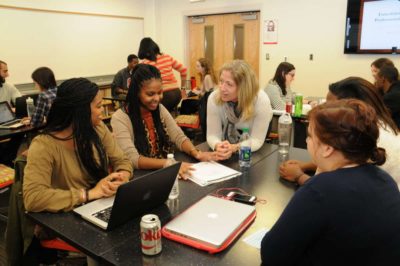
Since the start of the coronavirus pandemic, there have been radical shifts in the work and learning environment of community college leaders, employees, and students. National surveys are actively inquiring educational leaders about their experiences and responses to the changing environment. Likewise, numerous organizations are surveying students to learn about their transition to remote learning, plans to return in the fall, and implications on basic needs and well-being.
Important to the conversation are the people, community college employees, who engage with students on a day-to-day basis to solve student needs while also experiencing this pandemic themselves. Understanding their experiences with a changing work environment is important.
Campus climate assessments of employees provide an opportunity for community colleges to better serve their campus community and improve the working and learning environments for employees and students. They allow leaders to understand institutional culture, employee experiences, and capacity to promote institutional effectiveness and student success. Institutions can assess progress, highlight areas of growth, and identify opportunities for improvement.
Organizational climate is often described as the shared perceptions of members about policies, practices, and procedures. Learning about the perceptions of employees provides a baseline upon which to build and move forward with institutional planning and decision-making. Leaders play an essential role in the creation and communication of a college’s practices, policies, and routines; thus college leaders are a major driver of organizational change.
Across the state, the North Carolina Community College System (NCCCS) and individual community colleges are already investing in employees as evidenced by their commitment to creating an organizational climate that promotes development and success for their employees. One of the goals of NCCCS’s strategic plan is to “enhance and support workplace environments that value and engage employees” with a focus on providing professional development and competitive salaries. Along with this, 20 colleges have goals in their strategic plans that relate to employee engagement, professional development, or campus climate.
Importantly, some of the goals draw a direct connection between investing in employees as a means of supporting student success. Whether it is faculty, student services professionals, or facility workers, employees across divisions are responsible for creating environments and developing resources that are supportive of students. The extent to which employees feel valued, safe, and satisfied with their supervisor, work team, and leadership influence their ability to do their job effectively.
The Belk Center for Community College Leadership and Research is invested in providing support for colleges around campus climate through the National Initiative for Leadership and Institutional Effectiveness (NILIE) housed within the Center. NILIE has over 30 years of experience administering the PACE Climate Survey for Community Colleges (PACE) to approximately 120 colleges in over 30 states. PACE is a nationally recognized online instrument used by institutions to gather employee perspectives on campus climate and provide leaders with critical information for decision-making. Colleges use the PACE survey to support strategic planning and provide baseline information for new leaders.
In 2017, we started the Home State Initiative (Home State), a collaborative program that bridges the Belk Center’s mission to support community colleges with NC State’s land-grant mission to serve North Carolina. NILIE provides a free administration of the PACE survey to qualifying community colleges in rural areas of North Carolina facing declining enrollment, stagnant student outcomes, and/or challenges with employee recruitment and retention. In return, partnering community colleges engage regularly with the NILIE team about how they are using the survey findings to support institutional change. The Belk Center remains committed to supporting North Carolina’s community colleges by sharing the promising practices and information learned through the Home State collaboration as well as other programs with community colleges across the state.
In light of the current pandemic, the Belk Center developed a new survey that community colleges were able to participate in at no cost. The survey is designed to assess how employees are managing their professional and personal experiences during the pandemic and help colleges define and meet their current and future needs. Campus-based reports will be provided to community college presidents to support their ongoing efforts to make campuses safe, healthy, and productive learning and working environments.






